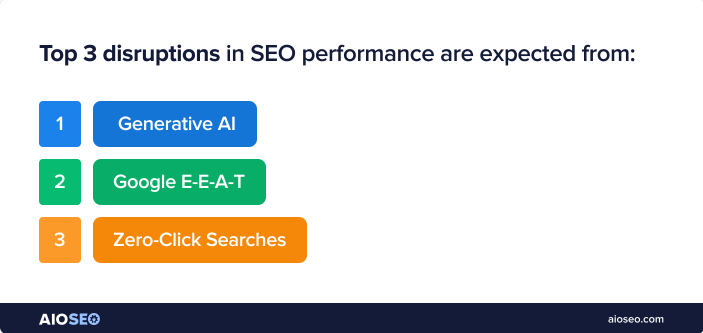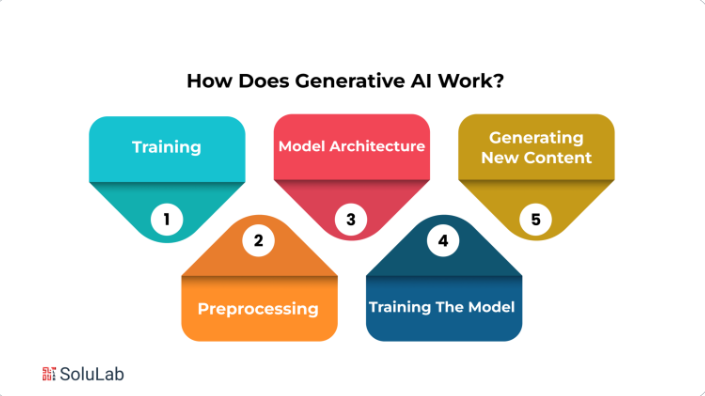For over two decades, search engine optimization (SEO) was the heart of content marketing. SEO has guided how businesses build their online presence by focusing on keywords, backlinks, and algorithmic ranking factors.
However, artificial intelligence (AI) is changing search. As large language models (LLMs) emerge and users begin to utilize them for online information searches, businesses must reassess their strategies and move beyond established methods. This shift has sparked a growing discussion among marketers: large language model optimization (LLMO) vs SEO, with traditional SEO facing uncertainty in a new era of search.
Why SEO Alone Is Not Enough Anymore
Businesses have long competed for the coveted top three organic spots on search engine results pages (SERPs). This is because the top three organic results receive more than two-thirds (68.7%) of all clicks on Google. SEO is a powerful tool for helping brands secure the top of the SERP, ensuring websites are crawlable and relevant to user search queries.
Unfortunately, the rules of visibility have changed again, with AI pulling attention away from traditional blue links and lowering organic traffic. While SEO in 2025 is not obsolete, it can no longer guarantee visibility. The rise of LLMs exposes limits to the old system.
Below are the key shifts affecting SEO in today’s search.

Image from AIOSEO
- Zero-Click Searches
Google AI Overviews is a new search feature that shows AI-generated summaries above organic search results. These summaries provide users with quick, cohesive answers synthesized from various credible sources. This resulted in the rise of zero-click searches, wherein a user finds an answer directly from SERPs without clicking a website link.
Since the rollout of AI overviews, businesses saw a staggering 18 to 64% decline in organic traffic. Additionally, there was a 60% increase in zero-click searches, indicating that more users are satisfied with the answers from AI search results.
- Generative AI
Generative AI refers to systems that create new content based on structures and patterns learned from vast amounts of training datasets. LLMs like ChatGPT, AI Overviews, AI Mode, and Copilot fall under this category, generating answers, summaries, and insights in real time.

Image from SoluLab
Unlike traditional search engines that rank based on keywords and backlinks, LLMs prioritize clarity, credibility, and semantic relevance. These AI-powered tools favor content that is structured, authoritative, and credible enough to be cited in AI responses. In fact, reports show that over 70% of users now turn to AI tools for search, signaling a major shift in search behavior.
- Google E-E-A-T
E-E-A-T, which means experience, expertise, authoritativeness, and trustworthiness, is a framework Google uses to assess the overall quality of a page. While E-E-A-T is not considered a direct ranking factor, it heavily influences a site’s search performance.
Marketing Week found that around 57.5% of marketers are using AI tools to generate mass content for their campaigns quickly. Although there is no rule against using AI-generated content, Google emphasizes that content quality and author credibility are a must for all websites.
How AI Search is Changing Content Discovery
The way users discover information online is undergoing a significant transformation. People are not “Googling” answers anymore; they’re asking them from AI assistants. Instead of digging through 10 blue links and browsing articles, users are expecting LLMs to deliver a direct answer in concise and accurate summaries.

Image from Backlinko
The way users interact with AI tools is drastically different from the user experience of old search engines:
- Classic Approach (Traditional Search):
1. Input query
2. Scan the list of results
3. Evaluate and choose links to click
4. Open one or more page results
5. Scan and read content
6. Piece information together
- Modern Approach (AI Search):
1. Input query
2. Receive a direct answer
3. Open source links
This drastic change in search behavior makes LLMO critical for businesses to stay visible and credible, as about 52% of users now prefer AI-powered search over traditional methods. By optimizing content for AI-driven search platforms, LLMO helps businesses stay discoverable, credible, and relevant, even when users skip SERPs entirely.
Integrating LLMO with SEO Workflows
To maintain visibility and trust as AI-powered search grows, businesses must incorporate LLMO alongside SEO and other digital marketing strategies. With 60% of marketers aiming to increase website traffic in the next 12 months, the need to embrace AI-driven strategies has grown more apparent. But while optimizing LLMs is essential, this does not mean working with an SEO agency Philippines is no longer necessary.
Below are ways to integrate LLMO into existing SEO strategies:
1. Map Keyword Clusters to Real Prompts
- Go beyond traditional keyword research and identify how users phrase questions in AI tools.
- Group related prompts into groups of interconnected pages, forming topic clusters. For example, “affordable SEO services for small business Philippines”, “SEO for startups”, and “best SEO Philippines”.
- Align keyword clusters around pillar pages. These pages act as a central hub for related, in-depth content on a website.
2. Structure Content for AI Readability
- Use clear headings, bullet points, and semantic flow to help LLMs analyze content.
- Include concise summaries and direct answers to common questions.
- Keep sentences and paragraphs short to make content easier to understand.
3. Engineer Prompts Within Content
- Once content is structured for AI readability, add natural language questions and answers into articles, followed by a structured, well-sourced answer.
- Use dual-structured prompts to target both featured snippet and LLM-based search results.
4. Embed Credibility Signals
- Use authoritative sources, expert quotes, and up-to-date statistics.
- Include author bios, publication dates, and citations to boost trustworthiness.
5. Implement Structured Data and Schema Markup
- Use schema markup to tag entities, frequently asked questions (FAQs), and product information.
- While Google prefers JSON-LD format, Markdown is considered an ideal choice for creating LLM-friendly content due to its simplicity.
6. Test Across AI Platform
- What works on one LLM may not work on the other. Run prompt tests on ChatGPT, Copilot, and other target AI platforms.
- Examine which content gets cited or summarized, and refine structure and language accordingly.

Image from Search Engine Land
Elevate Your SEO with Expert LLMO Techniques from DMP
The future of content marketing is not about LLMO vs SEO. As the search landscape continues to evolve, combining traditional SEO Manila techniques with advanced LLMO strategies is the key to ensuring that content reaches various digital channels.
Whether you need help optimizing your content for AI-powered search or empowering your current campaign, Digital Marketing Philippines (DMP) is ready to position your brand for success in both search engine and AI-driven platforms.
For over a decade, DMP has provided local and international brands with competitive omnichannel digital marketing services, from web development to quality SEO. Now in the age of AI, DMP has quickly adapted to offer the best AI+SEO services, ensuring our clients are already building their brand presence on various AI channels.
Contact us today to achieve the ultimate content visibility in AI search.
References:
https://medium.com/@buyeupavel/why-seo-alone-isnt-enough-for-dev-companies-in-2025-8033c24df92d
htthttps://searchengineland.com/zero-click-searches-up-organic-clicks-down-456660
httthttps://searchengineland.com/generative-ai-impact-website-rankings-traffic-443624
https://www.iguazio.com/glossary/llm-optimization
Jomer B. Gregorio is a well-rounded expert when it comes digital marketing. Jomer is also known as a semantic SEO evangelist and practitioner. Check out our Digital Marketing Services today and let us help you in achieving positive and profitable results for your business.
